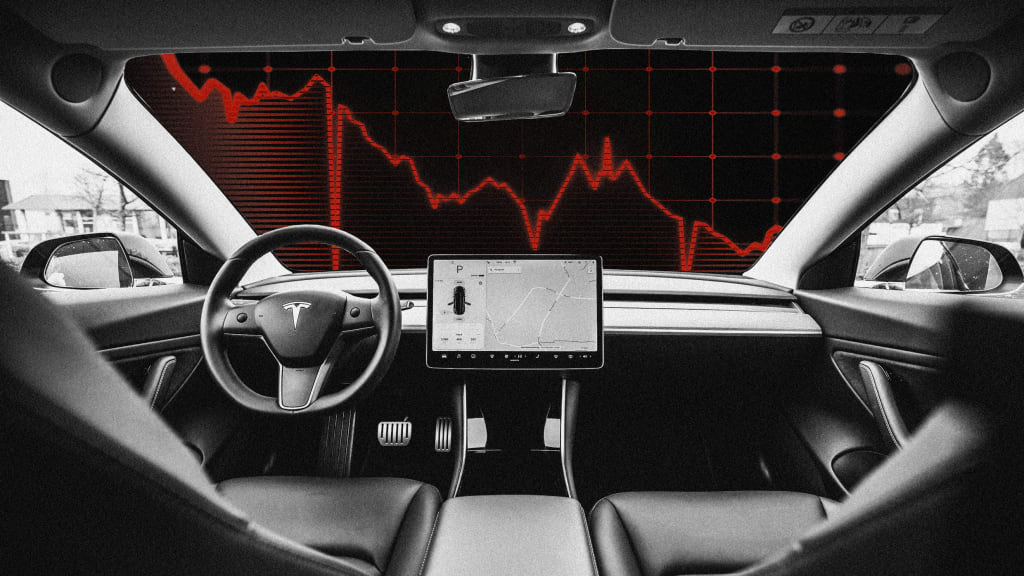In 2024, Tesla’s used car market experienced a significant shake-up as prices took a nosedive. The previously unstoppable pricing power of Elon Musk’s vehicles faced a reality check. Buckle up as we explore the factors behind these unprecedented drops. Is the age of premium used Teslas a thing of the past?
CarGurus data reveals a staggering depreciation in Tesla’s popular models. While Teslas once maintained high resale values, 2024 marked a stark shift. Let’s delve into the reasons behind this plunge, examining market dynamics and Tesla-specific issues.
Tesla’s Depreciating Values
Tesla cars are known for their tech-forward designs and impressive performance. However, 2024 saw values drop faster than other car brands, with Model 3 and Model Y leading the slide. The average price for a Model Y fell by a dramatic 25.5% over the year. Why? Let’s find out.
The Model Y wasn’t alone in this downturn; the Model 3 also took a hit, with a 25% depreciation. In stark contrast, similar models from Nissan and Ford saw much smaller drops of around 5%. So why did Teslas depreciate so much faster?
Electric Cars in the Spotlight
Interestingly, electric cars dominated the list of fastest depreciating vehicles. Jeep Wrangler 4xe and Chevrolet Bolt EV followed Tesla in losing value. Could this be a broader trend among electric vehicles? Or is Tesla’s situation unique?
Tesla’s price cuts on newer models further strained the resale values of used cars. The base Model Y’s price was slashed to $44,630, a move aimed at boosting sales but possibly signaling overvaluation of past models.
Factors Behind Tesla’s Price Slump
Though Tesla’s stock has been driven by hype, its car prices grapple with harsh realities. Many saw value fall as potential buyers weighed the cost against newer technology. The company’s unsteady self-driving tech rollout fuels this depreciation.
Only certain newer models feature advanced self-driving tech, leaving older Teslas less desirable. The uncertainty adds another layer of complexity, dampening resale prices and aligning them more with conventional consumer tech products.
Tesla’s value decrease was detached from Elon Musk’s political activities. Despite his engagement in politics, prices kept dropping, unaffected by his headlines. Curious, right? It seems other factors played more substantial roles here.
Comparative Depreciation
Comparing Tesla’s depreciation to other brands paints a vivid picture. While Nissan Maxima and Ford Mustang saw marginal dips, Tesla’s models plummeted. This rate was unexpected, given their previous steady hold on value.
Nissan and Ford models achieved more stable depreciation thanks to varying market strategies and brand perceptions. They didn’t slash prices or face tech-related disruptions like Tesla, cushioning their resale values from massive tumbles.
These variations reinforce how Tesla’s brand dynamics uniquely impact its used car values, which differ from traditional automakers. Tesla’s unique position means it suffers more in resale scenarios due to continuous innovation demands.
The Impact of Price Cuts
Tesla’s decision to lower the cost of new models aimed at reviving demand. However, it backfired by impacting the perceived value of older models. As new models became accessible, used car values couldn’t compete, establishing a negative cycle.
The ripple effect saw used Teslas struggle in a market flooded with affordable newer cars offering more features. Buyers weighed the pros and cons, often finding new models more alluring, thus sidelining used options.
Tesla’s Tech Effect
Tesla aligns closely with consumer tech products, unlike traditional cars. This trait means changes in technology greatly impact value retention. As cars gained new features, existing models quickly became outdated.
The smart tech allure fizzled as future-driven consumers prioritized enhancements in newer models. Used Teslas found it hard to maintain appeal without cutting-edge tech, leading to further depreciation.
Many used model features became obsolete with new releases, which played out like the tech sector, where the next big thing easily devalues the last generation. Buyers, naturally tech-savvy, sought newer versions with more innovations.
Market Reactions
The market wasn’t forgiving of Tesla’s depreciation. Many questioned if this trend hinted at bigger challenges within the electric vehicle sphere, considering broader shifts in consumer preference.
Analyst discussions surged as the depreciation caught attention. Was this a result of poor planning or a natural alignment with tech progression? Teslas, though, still maintain allure for those who cherish the brand’s futuristic edge.
Amid the chatter, Tesla’s fan base showed resilience, believing in the long-term vision despite short-term dips. Enthusiasts expressed hopefulness, viewing depreciation as a minor hiccup, expecting the brand to rebound strongly soon.
Future Predictions
Most predict that Tesla will continue innovating, leading the electric market. However, they suggest the company must balance innovation with value retention to avoid future resale woes.
Tesla’s strategy needs a tweak. Experts argue for a focus on maintaining car value post-purchase while introducing new tech. By stabilizing resale values, the brand could see more consistent demand.
Ensuring long-lasting appeal requires attention to depreciation factors. Market trends emphasize the need for smarter, sustainable pricing structures that don’t undermine used models, securing a stronger position in the industry.
Consumer Takeaways
Are you considering a used Tesla in 2024? Expect more reasonable prices compared to previous years. It’s a buyer’s market, packed with great deals for those eyeing electric cars.
Potential buyers should weigh the benefits and risks. While prices are enticing, consider future depreciation and tech updates. After all, a car is a significant investment that demands careful evaluation and planning.
As Tesla navigates the balance between cutting-edge innovation and value retention, used car buyers are left with appealing options. The value dip offers chances for smart investments.
The future remains uncertain. However, Tesla’s resilience and commitment to technology suggest a promising path forward, despite present challenges.





